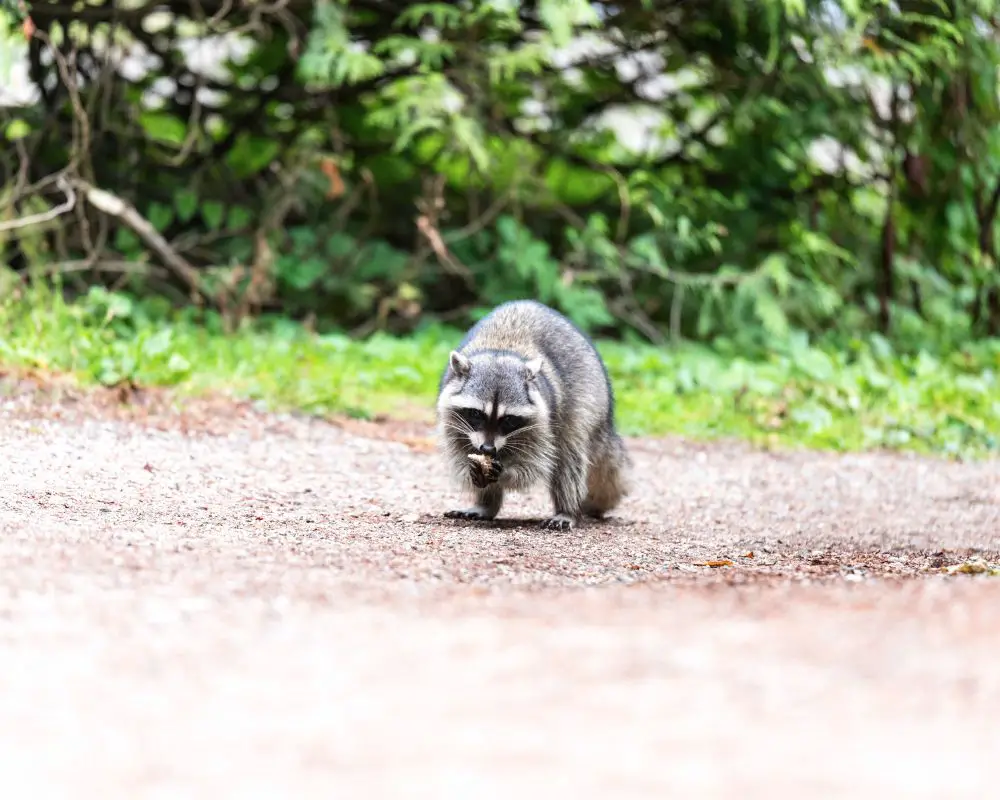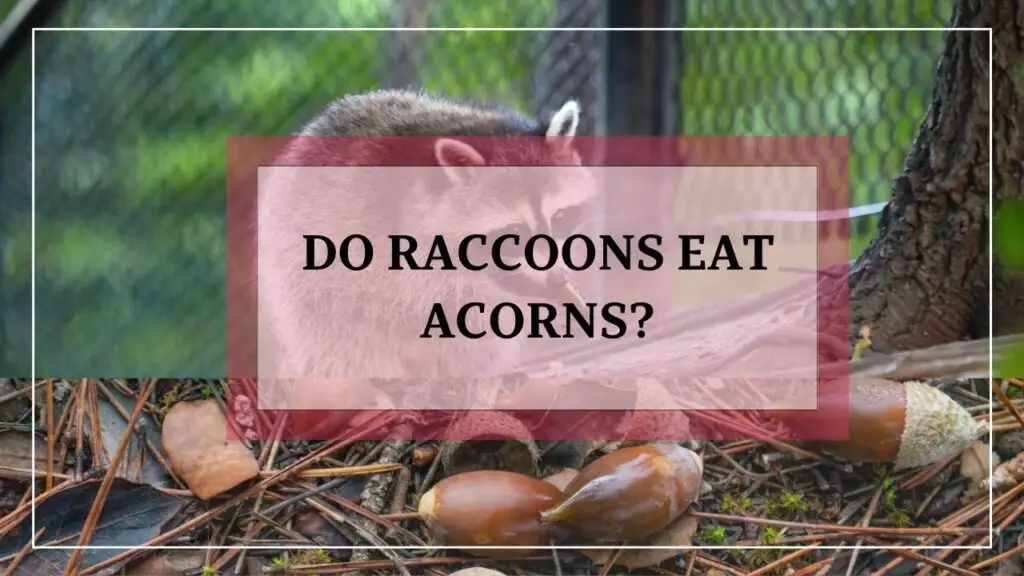Raccoons are known for their opportunistic eating habits, and they will consume a wide variety of food items in the wild.
One staple food in the raccoon diet is acorns. These small, nut-like fruits are a valuable source of nutrition for raccoons, as well as many other animals.
In this article, we will take a closer look at the relationship between raccoons and acorns, examining why acorns are such an important food source for raccoons, and how raccoons can find, extract, and store acorns for later consumption. We will also delve into the impact that raccoons’ consumption of acorns can have on the ecosystem, and how other animals that rely on acorns as a food source may be affected.
The Nutritional Benefits Of Acorns For Raccoons
Acorns are a rich source of carbohydrates for raccoons, which provide energy for their daily activities. They are also a good source of fiber, which helps with digestion. Additionally, acorns contain vitamins and minerals such as magnesium, potassium, calcium, and Vitamin B6. These nutrients help to support the overall health and wellness of raccoons.
Note: Acorns also contain tannins which can be toxic in large quantities. Raccoons have the ability to detoxify tannins, but they need to consume a variety of food sources to avoid consuming too many tannins.
How Raccoons Can Extract The Acorns From Their Shells?

Raccoons have several adaptations that allow them to extract acorns from their shells. One of the most important is their front paws, which are highly dexterous and equipped with long, slender fingers and opposable thumbs. These allow raccoons to grasp and manipulate objects, including acorns, with precision and ease.
Raccoons also have strong, sharp claws that they use to crack open acorn shells. They will hold an acorn in one paw and use the other paw to strike it against a hard surface. This allows the raccoons to break the shell open and access the nut inside.
Another adaptation of raccoons for cracking nuts is the shape of their teeth. Raccoons have large, sharp incisors that are well-suited for gnawing through hard shells. They also have large molars that can crush and grind nuts to make them easier to digest.
How Raccoons Can Find And Store Acorns For Later Consumption?
Raccoons have several adaptations that allow them to find and store acorns for later consumption. One of the most important is their sense of smell, which is highly developed and allows them to locate acorns, even when they are buried underground. Raccoons also have good vision, which allows them to spot acorns on the ground or in trees.
When they find a good source of acorns, raccoons will often hoard them for later consumption. They will carry acorns to a safe location, such as a hollow tree or rock crevice, and bury them in the ground or hide them among leaves or other debris. Raccoons can remember where they buried the acorns and can return to the location later to retrieve them.
Raccoons also can recognize when acorns are ready to be harvested. They will wait for acorns to mature before collecting them and have a good sense of timing. Raccoons also can differentiate between ripe and unripe acorns and will only collect ripe acorns for consumption.
Other Animals That Feed On Acorns
Acorns are an important food source for many animals, including deer and squirrels.
Deer are known to eat acorns as part of their diet, especially during the fall and winter months when other food sources are scarce. They can extract the acorns from the shells using their sharp incisors and molars. Acorns provide deer with a rich source of carbohydrates, which provide energy for their daily activities.
Squirrels also rely heavily on acorns as a food source. They are known to collect and store acorns for later consumption, burying them in the ground or hiding them in crevices or other safe locations. Squirrels can crack open acorns using their sharp incisors. Acorns provide squirrels with energy, fiber, and important nutrients such as magnesium, potassium, calcium, and Vitamin B6.
In addition to deer and squirrels, many other animals also rely on acorns as a food source, including bears, chipmunks, and wild pigs. These animals have adaptations such as strong jaws and teeth, or sharp claws that allow them to extract acorns from the shells and consume them.
FAQs
What Nocturnal Animals Eat Acorns?
Several nocturnal animals eat acorns as part of their diet. Some examples include:
1. Raccoons: As previously mentioned, raccoons are known to eat acorns and can extract them from shells using their dexterous front paws and sharp claws. They also have strong, sharp incisors that allow them to gnaw through hard shells.
2. Opossums: Acorns are a significant food source for opossums, they can extract the acorns from the shells using their sharp teeth and claws.
3. Skunks: Skunks, like raccoons and opossums, can crack acorns open using their sharp teeth and claws, and will eat acorns as part of their diet.
4. Bats: Certain species of bats, such as the hoary bat, have been known to consume acorns. They generally eat the acorns whole and they can digest the shells as well.
5. Porcupines: Porcupines are herbivores and eat a wide variety of plants, acorns are a part of their diet as well. They can crack the acorns open with their sharp incisors and also consume the bark of trees.
It’s worth noting that many animals that are primarily active during the day may also consume acorns at night, so this list is not exhaustive.[1]
Do Acorns Attract Rodents?
Yes, acorns can attract rodents such as squirrels, mice, and rats. These animals are attracted to the high-calorie content of acorns, which provide them with energy for the winter months. They collect and store acorns for later consumption, either by burying them in the ground or hiding them in crevices or other safe locations. They also can crack open acorns using their sharp incisors and claws.
It’s important to note that acorns can also attract other animals such as deer, bears, raccoons, and wild pigs which are also acorn consumers. This can lead to a higher concentration of these animals in an area with a plentiful acorn source, which can have both positive and negative effects on the local ecosystem.
Additionally, acorns can also attract insects such as beetles and weevils, which can cause damage to acorn trees by feeding on the acorns or the tree itself. This can lead to a decline in acorn production and the overall health of the tree.
Do Rabbits Eat Acorns?
Rabbits do not typically eat acorns as part of their diet. Rabbits are herbivores and primarily eat a diet of grasses, clover, and other leafy greens. They also feed on fruits, vegetables, and flowers if they are available.
Acorns are too hard for rabbits to eat and also lack the nutritional components that they need. They don’t have the adaptations like strong jaws and teeth or sharp claws that allow them to extract acorns from the shells and consume them as deer, squirrels, raccoons, and possums do. However, if a rabbit is in the wild and food is scarce, they might eat acorns as they are opportunistic feeders but it wouldn’t be a preferred food source.
What To Do With Fallen Acorns?
There are several things you can do with fallen acorns, depending on your interests and resources:
1. Collect and store them: You can collect acorns and store them in a dry, cool place. They can be used to decorate your home, or used in crafts and DIY projects.
2. Plant them: You can plant acorns in a suitable location in your yard or garden. If you’re interested in growing oak trees, planting acorns is a great way to do it. Be aware that not all acorns will germinate, and it may take several years for the oak tree to mature.
3. Use them for animal feed: If you have backyard chickens, pigs, or other animals, acorns can be a natural and nutritious food source for them.
4. Use them for cooking: Acorns can be roasted or ground up to make flour for baking. You will need to remove the shells and leach out the tannins before using acorns for cooking.
5. Leave them for the wildlife: If you have a backyard or live near a park, you can leave the acorns on the ground for local wildlife such as squirrels, raccoons, and deer to find and eat.
6. Compost them: If you have a compost pile, you can add acorns to it. They will break down over time and add valuable nutrients to your soil.
7. Dispose of them: If you have too many acorns and don’t want to use them, you can dispose of them by sweeping them up and putting them in the trash.
What Do Raccoons Eat At Night?
Depending on what is available to them. At night, raccoons typically forage for food, so their diet can vary depending on the season and location. Here are some examples of what raccoons might eat at night:
1. Fruits and berries: Raccoons are known to eat a variety of fruits and berries, such as apples, berries, cherries, and grapes.
2. Vegetables: Raccoons may also eat vegetables, such as corn, beans, and peas.
3. Insects: Raccoons are known to eat insects, such as beetles, crickets, and grubs.
4. Fish and other aquatic animals: Raccoons are skilled hunters and can catch fish, crayfish, frogs, and other aquatic animals.
Eggs and small animals: Raccoons may also eat eggs, such as bird eggs, and small animals like rats, mice, and squirrels.
Human-provided food: Raccoons may be attracted to human-provided food such as garbage, pet food, or food left out for other animals.

